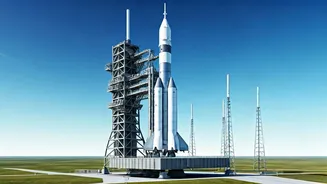Explore Your Passions
The initial step towards securing a role at NASA involves a deep dive into self-discovery. Begin by honestly evaluating your areas of genuine interest.
NASA presents a wide array of career options, spanning scientific research, engineering, technology, and beyond. Identify what truly sparks your curiosity and aligns with your strengths. This self-assessment is essential as it will guide your educational choices and skill development. Consider researching NASA's diverse departments and the roles within each, to determine which paths resonate most with you. Explore various resources, such as the NASA website, to gain insights into specific job descriptions and required qualifications. Understanding your interests early on will provide a solid foundation for your future career goals, making it easier to navigate the complexities of applying and interviewing. It's about finding where your talents best fit within the organization's vast scope.
Education: The Foundation
Education forms the cornerstone for any aspiring NASA employee. A bachelor's degree is typically the minimum requirement, with advanced degrees, such as master's or doctoral degrees, often preferred, particularly for research and specialized roles. The specific field of study significantly impacts job prospects. Degrees in engineering, computer science, physics, and aerospace-related disciplines are highly valued. However, NASA also recruits individuals with backgrounds in fields like mathematics, biology, and even social sciences, reflecting the breadth of its projects. Choosing the right educational path is crucial. Research programs at reputable universities that have strong ties with NASA or similar space agencies. Seek out opportunities for hands-on projects, research collaborations, and internships to supplement your academic knowledge with practical skills. Furthermore, continuous learning is essential; stay updated with industry trends and technological advancements through relevant courses and certifications to maintain a competitive edge.
Certifications & Courses
To bolster your qualifications, consider pursuing online courses and certifications relevant to your desired career path at NASA. These additional credentials can demonstrate your commitment to professional development and enhance your skill set. Numerous online platforms offer courses in areas such as project management, data analysis, programming languages (like Python or C++), and specialized engineering software (e.g., CAD or MATLAB). Look for certifications that are recognized and valued within the aerospace industry. Examples include certifications in project management (like PMP), Six Sigma, or specific engineering disciplines. These courses and certifications not only expand your knowledge base but also showcase your initiative and dedication to learning. Furthermore, they can help you acquire in-demand skills and make your application stand out from the competition. Evaluate your skills objectively to identify areas for improvement and select certifications that address those gaps.
Practical Experience Matters
Gaining practical experience through internships is a highly effective way to prepare for a career at NASA. Internships provide invaluable hands-on experience, allowing you to apply your academic knowledge in real-world scenarios. NASA offers various internship programs for students and recent graduates, providing opportunities to work on cutting-edge projects alongside experienced professionals. These internships can range from engineering and scientific research to administrative and support roles. To find internship opportunities, regularly check NASA's official website and other platforms that list aerospace internships. Crafting a strong application and resume is essential; highlight relevant skills, coursework, and any previous experience. During the internship, actively seek opportunities to learn new skills, network with professionals, and demonstrate your initiative and commitment. Practical experience significantly improves your chances of securing a full-time position by demonstrating your ability to adapt, solve problems, and contribute to a team.
Develop Soft Skills
In addition to technical skills and education, building strong soft skills is critical for succeeding at NASA. Soft skills encompass interpersonal abilities, communication, teamwork, problem-solving, and leadership qualities. NASA values individuals who can collaborate effectively in diverse teams and communicate complex ideas clearly and concisely. To develop these skills, engage in activities such as group projects, volunteer work, and leadership roles in student organizations. Practice your communication skills through presentations, writing, and public speaking. Learn to manage conflicts and resolve disagreements constructively. Participate in workshops or training sessions focused on team building, communication, and leadership. These activities not only enhance your soft skills but also demonstrate your ability to work collaboratively and contribute to a positive work environment, ultimately making you a more well-rounded and appealing candidate.












